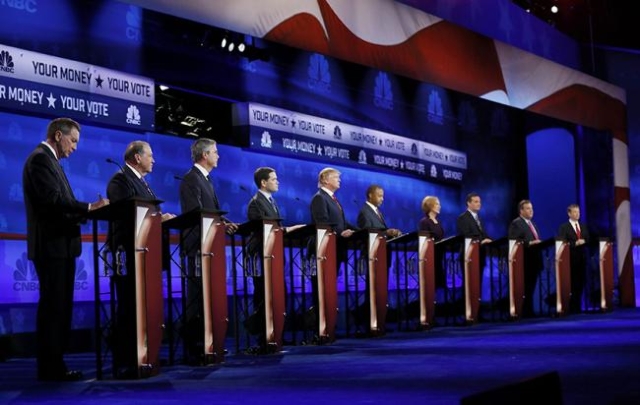Bashing the media is easy; debating is harder
In politics, especially Republican politics, you can never go wrong blaming the media.
There was a lot of media-blaming at the CNBC Republican debate Wednesday. Texas Sen. Ted Cruz, Florida Sen. Marco Rubio, even New Jersey Gov. Chris Christie joined the fray.
And the crowd went wild.
As a longtime journalist, I've heard my share of accusations of bias, even though as a columnist I'm paid to write my opinion. (My favorite charge: "Your opinion is so biased!")
My typical response: So what? Everybody's biased. It doesn't mean you can't ask a candidate a question. And if that candidate is good, he or she will be able to turn any question to his or her advantage.
Cruz's criticism was most direct; he ignored a question about his opposition to the debt-limit deal to complain about (wait for it) not getting substantive questions. And then he had the gall to complain about not getting a chance to answer the original question!
Christie had a legitimate point when he questioned the wisdom of debating fantasy football rules when there were more urgent problems, including the national debt. But does he really want more attention paid to various Republican plans that so badly explode the deficit?
Rubio not only took issue with the national media, he denounced his home-state Sun-Sentinel newspaper, which called for Rubio to resign rather than continue missing votes while on the campaign trail. (That newspaper endorsed Democrats John Kerry and Barack Obama when they ran for president and missed Senate votes, Rubio said.)
"It's evidence of the bias that exists in the American media today," Rubio said.
But if the media really were comprised of liberals, wouldn't they actually encourage Rubio to keep campaigning? Wouldn't liberals want the seat filled by an absentee senator (a lame duck one at that!) who can't impose his conservative philosophy by voting?
Besides, the introduction of that issue helped Rubio repel a lame jab leveled by former Florida Gov. Jeb Bush, who said he felt let down by Rubio's poor constituent service and also urged him to quit. Rubio parried, saying Bush is trying to execute a comeback in the style of Arizona Sen. John McCain, who missed plenty of votes himself when running in 2008.
"The only reason you are doing it now," Rubio said, "is because we are running for the same position, and someone has convinced you that attacking me is going to help you."
Of course, the liberal media rallied to its own defense.
"What happened in this debate wasn't an attack by the press on the candidates," wrote William Saletan on Slate.com. "It was an attack by the candidates on the press. [John] Harwood, [Becky] Quick, and the other CNBC panelists were no harsher to the Republicans on Wednesday than CNN's Anderson Cooper was to Clinton and other Democrats in their debate two weeks ago. What was different this time was the reaction. Presented with facts and figures that didn't fit their story, the leading Republican candidates accused the moderators of malice and deceit."
Or Ezra Klein over on Vox.com: "Cruz's strategy was smart, and he was arguably the debate's big winner. But it bespoke a deeper weakness. Republicans have boxed themselves into some truly bizarre policies — including a set of tax cuts that give so much money to the rich, and blow such huge holes in the deficit, that simply asking about them in any serious way seems like a vicious attack."
But even conservatives got a little tired of the complaining. "GOP's media bashing is getting boring. CNBC Qs not measurably different from CNN or FNC. They're just imitating Trump." That was a Tweet from no less than Ann Coulter, replying to Republican National Committee Chairman Reince Priebus.
— Steve Sebelius is a Review-Journal political columnist and co-host of the show "PoliticsNOW," airing at 5:30 p.m. Sundays on 8NewsNow. Follow him on Twitter (@SteveSebelius) or reach him at 702-387-5276 or ssebelius@reviewjournal.com.






















